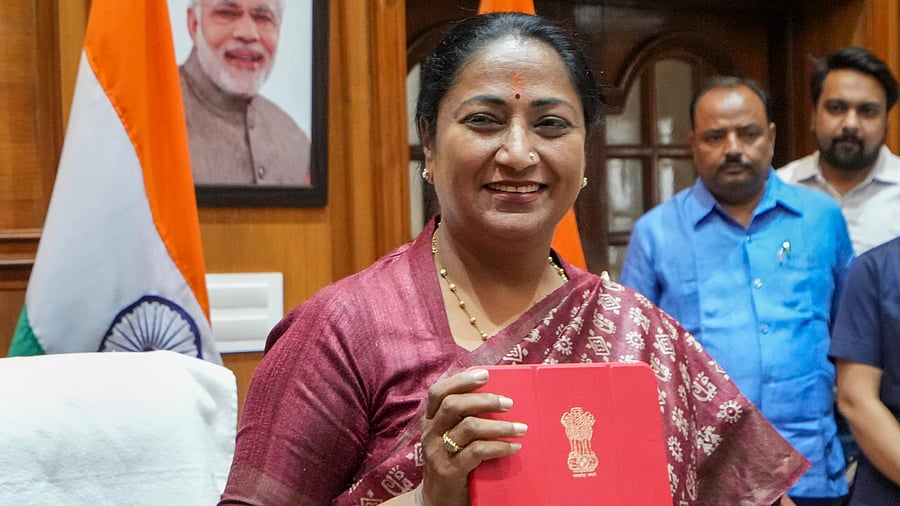
Delhi CM Rekha Gupta
Credit: PTI Photo
A month ago, Delhi Chief Minister Rekha Gupta was pictured sitting next to her husband in a meeting with Delhi government officials. The Opposition AAP termed it a "Phulera moment" in Indian politics — the reference being the fictional village of Phulera in the popular OTT show Panchayat where the protagonist's role as panchayat chief is actually carried out by her husband.
In the eight months since she took oath as the chief minister of Delhi in February this year, Gupta, the BJP's only woman CM at present, has courted controversies each passing month.
Recently, she reportedly requested organisers of Durga Puja pandals in the national capital to participate in the government's 'Sewa Pakhwada' – beginning on Prime Minister Narendra Modi’s birthday on September 17 – and place the PM’s photograph "near the feet of Goddess Durga".
In March, while participating in a debate in the Delhi Assembly, she used street slang, considered derogatory, to refer to beat constables. The 50-year-old first- time MLA elected as the CM in February this year had to clarify later that she did not mean to belittle police personnel, hinting that she was willing to evolve.
When she was elected as the next CM of Delhi in a meeting of the 48 MLAs of the BJP on February 20, many beyond political circles barely knew her.
Gupta, who honed her skills in the Akhil Bharatiya Vidyarthi Parishad (ABVP) and then later in the BJP, had started her political journey in Delhi University as a student of Daulat Ram College in 1992 where she took part in student politics as part of the student wing of the RSS. By 1995, she had been elected as the secretary of the Delhi University Students’ Union (DUSU). In 1996, she was elected DUSU president. Gupta has served as a municipal councillor twice, and has lost Assembly elections twice.
In 1995, Gupta worked in DUSU alongside Congress leader Alka Lamba, who is currently the president of Congress Mahila Morcha. Lamba says that while she did not see eye to eye with Gupta on ideology, they shared the same concerns when it came to women’s issues. "Ideologically, we were strongly opposed to each other. But I remember working with her on women’s issues — there were issues of women's hostels, safety of women in the campus with more lights and the need for more women's seats and more women's colleges," Lamba recalls.
Gupta's elevation to the top post, though intriguing, is not entirely unexpected, given the BJP's history of choosing faceless names in other states in the recent past, such as Bhajanlal Sharma in Rajasthan, Mohan Yadav in Madhya Pradesh and Vishnu Deo Sai in Chhattisgarh. Political analyst Rasheed Kidwai says that the BJP is borrowing a leaf out of the old Congress book, especially from Indira Gandhi’s.
"During Nehru's tenure, regional satraps were larger than life, such as Rajaji, BC Roy and Pratap Singh Kairon. But when Indira Gandhi came, she preferred lightweights. For instance, HN Bahuguna, CV Gupta, DP Mishra, or for that matter, Arjun Singh or Motilal Vora. There's a famous quote by Tangturi Anjaiah, who was selected as chief minister (of Andhra Pradesh) – 'I don’t know why he came and why he's going'," Kidwai says.
The political analyst feels the stalwarts of the BJP's Delhi unit have been sidelined to this end. "The decision to elect a relatively unknown face brings in shock value, keeps the elected leader in debt of the central unit, and is usually done when a party is sure-footed in the central stage. Delhi is crucial for the BJP, and Modi and Shah will want to have their imprint here," Kidwai adds.
One of the key challenges that she now faces is the upcoming winter season and ensuing air pollution caused by the burning of stubble in nearby Punjab. The BJP, which had time and again criticised the previous AAP regime in Delhi over the issue as the AAP ruled in Punjab, too, will now face a litmus test over its selection of Gupta.
Another boiling issue for Delhiites which Gupta will need to solve is the pollution in the Yamuna — a cause on which several elections have been fought over the years. The upcoming Chhath festival, considered auspicious by the capital’s significant Purvanchali population, is when the river's pollution is the highest. As she has time and again raised the issue, Gupta's actions on this front will be closely watched.
For an informed electorate such as Delhi’s, Gupta's stature is a lightweight one, especially in comparison to the last 25 years of governance under her much decorated predecessors Sheila Dixit and Arvind Kejriwal. Will she be able to match this? Gupta has a lot of work ahead to prove herself.